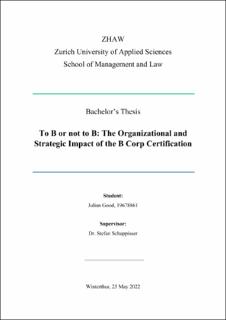Please use this identifier to cite or link to this item:
https://doi.org/10.21256/zhaw-26509Full metadata record
| DC Field | Value | Language |
|---|---|---|
| dc.contributor.advisor | Schuppisser, Stefan | - |
| dc.contributor.author | Good, Julian | - |
| dc.date.accessioned | 2022-12-21T13:36:00Z | - |
| dc.date.available | 2022-12-21T13:36:00Z | - |
| dc.date.issued | 2022 | - |
| dc.identifier.uri | https://digitalcollection.zhaw.ch/handle/11475/26509 | - |
| dc.description.abstract | Since the 1980s, the concept of corporate purpose has been dominated by shareholder value maximisation. However, this model has several dysfunctionalities. Particularly following the financial crisis in 2008, society’s expectations for businesses seem to have changed, and citizens demand that companies act in more responsible and ethical ways. These dynamics have led to the emergence of hybrid businesses combining economic goals with ethical, social, and environmental concerns. One of these hybrid forms has been developed through the B Corp movement, which introduced a new legal form, namely the “Benefit Corporation”, and a certification system to certify “B Corps.” However, the origins and impact of these new hybrid forms remain under-investigated. To address this gap, this thesis analysed the motivators which lead companies to become certified B Corps. Moreover, the impacts of this certification along the value chain were analysed and the perceived benefits and challenges evaluated. The structure of this thesis is based on a theoretical foundation which is contrasted and extended via an empirical investigation. The empirical method followed a case study analysis among five Swiss B Corps, with qualitative data in the form of interviews representing the sole data source. Besides the intrinsic motivation to use business as a force for good, companies certify for instrumental and reputational reasons, to benchmark their performance in corporate social responsibility (CSR) but not to legally protect their purpose. From an organisational viewpoint, rather than changing internal structures, the B Corp certification gave an impetus to the improvement and formalisation of existing procedures. The main benefits of certification included market differentiation, attraction of talents and inclusion in the B Corp community, whereas challenges included the elaborate and time-consuming certification process, which is repeated every third year against an evolving standard, and the lack of customer awareness of the B Corp Label in the German-speaking market. In conclusion, the certification can provide an effective framework for strategy-building and improving practices within CSR. Additionally, it provides third-party validation for B Corps to communicate their values transparently and credibly. However, the certification should not be overestimated as single factor that causes changes given that B Corps already embed their values in their business model before becoming certified. Future research should analyse impacts of the certification in a more extensive and long-term way. Other areas of further research could focus on the implementation of a legal Benefit Corporation structure in Switzerland or the response of investors to the B Corp movement. | de_CH |
| dc.format.extent | 118 | de_CH |
| dc.language.iso | en | de_CH |
| dc.publisher | ZHAW Zürcher Hochschule für Angewandte Wissenschaften | de_CH |
| dc.rights | http://creativecommons.org/licenses/by-nc-nd/4.0/ | de_CH |
| dc.subject.ddc | 658.1: Organisation und Finanzen | de_CH |
| dc.title | To B or not to B : the organizational and strategic impact of the B Corp certification | de_CH |
| dc.type | Thesis: Bachelor | de_CH |
| dcterms.type | Text | de_CH |
| zhaw.departement | School of Management and Law | de_CH |
| zhaw.publisher.place | Winterthur | de_CH |
| dc.identifier.doi | 10.21256/zhaw-26509 | - |
| zhaw.originated.zhaw | Yes | de_CH |
| Appears in collections: | BSc Betriebsökonomie | |
Files in This Item:
| File | Description | Size | Format | |
|---|---|---|---|---|
| 2022_Good_Julian_Bsc_BOE.pdf | 2.93 MB | Adobe PDF |  View/Open |
Show simple item record
Good, J. (2022). To B or not to B : the organizational and strategic impact of the B Corp certification [Bachelor’s thesis, ZHAW Zürcher Hochschule für Angewandte Wissenschaften]. https://doi.org/10.21256/zhaw-26509
Good, J. (2022) To B or not to B : the organizational and strategic impact of the B Corp certification. Bachelor’s thesis. ZHAW Zürcher Hochschule für Angewandte Wissenschaften. Available at: https://doi.org/10.21256/zhaw-26509.
J. Good, “To B or not to B : the organizational and strategic impact of the B Corp certification,” Bachelor’s thesis, ZHAW Zürcher Hochschule für Angewandte Wissenschaften, Winterthur, 2022. doi: 10.21256/zhaw-26509.
GOOD, Julian, 2022. To B or not to B : the organizational and strategic impact of the B Corp certification. Bachelor’s thesis. Winterthur: ZHAW Zürcher Hochschule für Angewandte Wissenschaften
Good, Julian. 2022. “To B or Not to B : The Organizational and Strategic Impact of the B Corp Certification.” Bachelor’s thesis, Winterthur: ZHAW Zürcher Hochschule für Angewandte Wissenschaften. https://doi.org/10.21256/zhaw-26509.
Good, Julian. To B or Not to B : The Organizational and Strategic Impact of the B Corp Certification. ZHAW Zürcher Hochschule für Angewandte Wissenschaften, 2022, https://doi.org/10.21256/zhaw-26509.
Items in DSpace are protected by copyright, with all rights reserved, unless otherwise indicated.